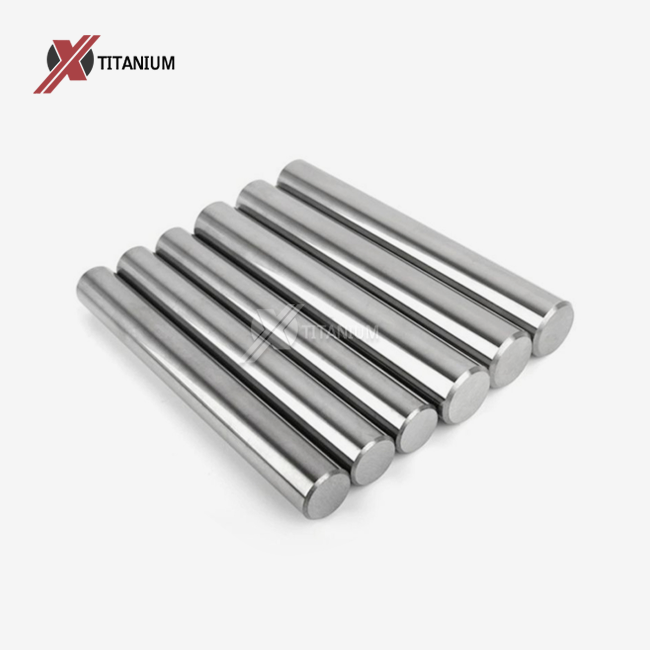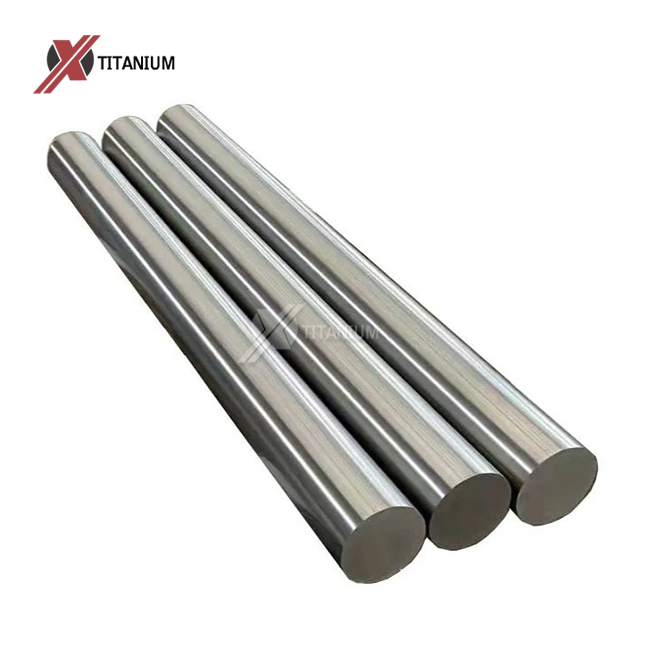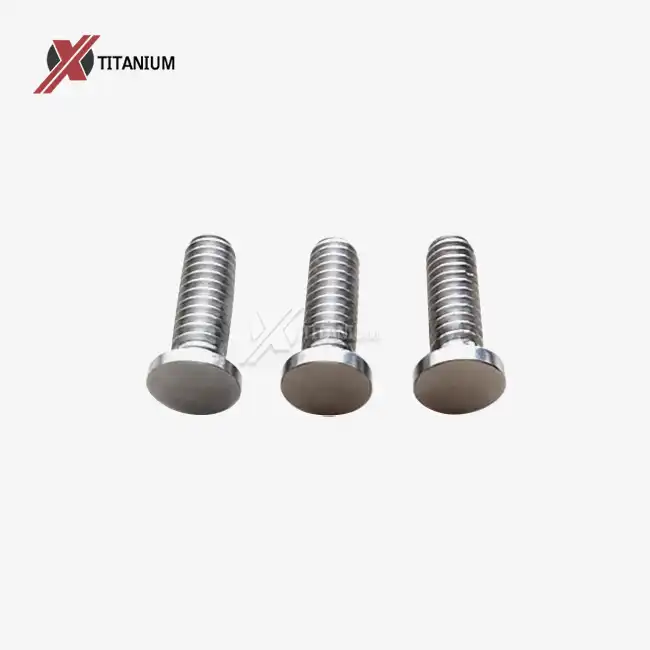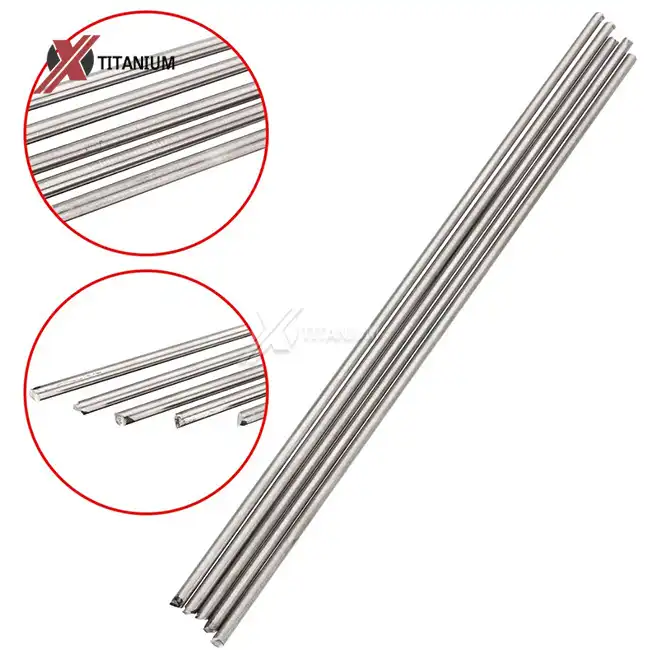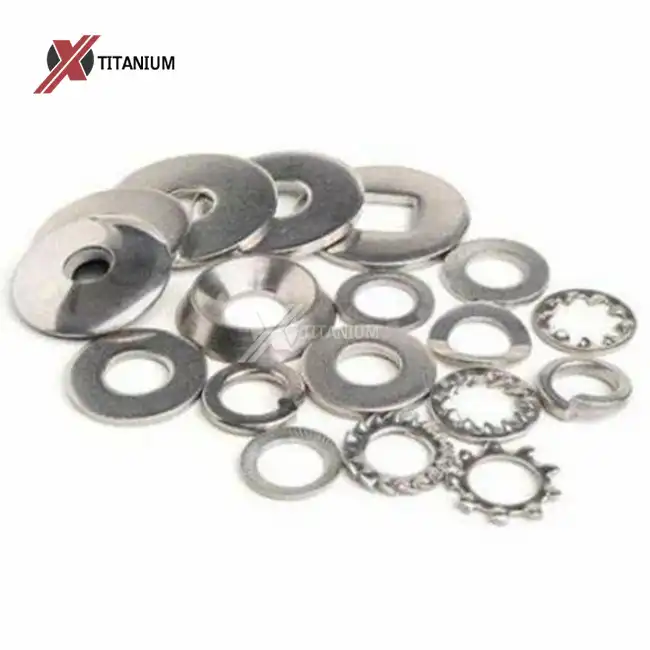Understanding Grade 7 Titanium Rod: Composition and Properties
Chemical Composition and Its Impact on Performance
Grade 7 titanium rod is a specialized alloy that combines the inherent strength of titanium with the corrosion-resistant properties of palladium. The alloy composition, typically Ti-0.12Pd, introduces a small but significant amount of palladium into the titanium matrix. This addition of palladium plays a crucial role in enhancing the material's resistance to corrosive environments.
The palladium content in Grade 7 titanium rod creates a protective layer on the surface when exposed to corrosive media. This layer, known as a passive film, acts as a barrier against chemical attack, effectively shielding the underlying metal from degradation. The presence of palladium also contributes to the alloy's resistance to crevice corrosion, making it particularly suitable for applications involving tight spaces or joints exposed to corrosive fluids.
Mechanical Properties and Structural Advantages
Beyond its corrosion resistance, Grade 7 titanium rod boasts impressive mechanical properties that contribute to its versatility and reliability in various applications. With a minimum tensile strength of 550 MPa and a yield strength of 480 MPa, this alloy offers robust structural integrity even under significant loads. The material's elongation of at least 15% provides a degree of ductility, allowing for some deformation before failure and enhancing its overall toughness.
The combination of high strength and relatively low density (4.43 g/cm³) results in an exceptional strength-to-weight ratio. This characteristic makes Grade 7 titanium rod an attractive option for weight-sensitive applications, particularly in aerospace and marine engineering where reducing overall mass is crucial. The material's hardness, capped at 150 HB, strikes a balance between wear resistance and machinability, facilitating both durability in service and ease of fabrication.
Applications of Grade 7 Titanium Rod in Corrosive Environments
Chemical Processing Industry
In the chemical processing industry, Grade 7 titanium rod finds extensive use in equipment exposed to highly corrosive substances. Its resistance to a wide range of chemicals, including chlorine, nitric acid, and sulfuric acid, makes it invaluable for constructing reactor vessels, heat exchangers, and piping systems. The material's ability to withstand aggressive chemical environments without degradation ensures the longevity of processing equipment and minimizes the risk of contamination or failure.
Chemical plants often utilize Grade 7 titanium rod for components in chlor-alkali production, where exposure to hot brine solutions and chlorine gas is common. The alloy's resistance to pitting and crevice corrosion in these environments significantly extends the operational life of equipment, reducing maintenance costs and downtime associated with material failure.
Marine and Offshore Applications
The marine environment presents a unique set of challenges for materials, combining the corrosive effects of saltwater with mechanical stresses from waves and currents. Grade 7 titanium rod excels in this setting, offering superior resistance to seawater corrosion and marine biofouling. Its application in offshore structures, such as oil rigs and desalination plants, provides long-term protection against the harsh marine atmosphere.
Shipbuilding and marine engineering benefit from Grade 7 titanium rod's properties in various components, including propeller shafts, heat exchangers, and pumps. The material's resistance to erosion-corrosion, coupled with its high strength-to-weight ratio, contributes to improved fuel efficiency and reduced maintenance requirements for marine vessels.
Aerospace and Aviation
In the aerospace industry, where weight reduction and material reliability are paramount, Grade 7 titanium rod offers a compelling solution for components exposed to corrosive environments. Its use in aircraft hydraulic systems, particularly in areas susceptible to de-icing fluids or marine atmospheres, ensures long-term performance integrity. The material's resistance to stress corrosion cracking makes it suitable for critical structural components in both commercial and military aircraft.
Space exploration vehicles and satellites also benefit from Grade 7 titanium rod's properties. The material's ability to withstand the corrosive effects of atomic oxygen in low Earth orbit, combined with its lightweight nature, makes it an ideal choice for spacecraft structures and components.
Manufacturing and Quality Control of Grade 7 Titanium Rod
Production Processes and Techniques
The manufacturing of Grade 7 titanium rod involves a series of sophisticated processes designed to ensure the material meets stringent quality standards. The production typically begins with the careful selection and melting of raw materials, including high-purity titanium sponge and palladium. Advanced vacuum arc remelting (VAR) techniques are often employed to achieve the desired alloy composition and minimize impurities.
Following the melting process, the material undergoes forging or extrusion to form the rod shape. This step is crucial in developing the alloy's microstructure and mechanical properties. Subsequent heat treatment processes, such as annealing, are performed to optimize the material's strength and ductility. The rods may then be subjected to cold working or hot rolling to achieve the final dimensions and surface finish required for specific applications.
Quality Assurance and Testing Procedures
Rigorous quality control measures are implemented throughout the production of Grade 7 titanium rod to ensure consistency and reliability. Non-destructive testing techniques, including ultrasonic inspection and eddy current testing, are employed to detect any internal defects or inconsistencies in the material. Surface inspections, such as dye penetrant testing, help identify surface imperfections that could compromise the rod's performance in corrosive environments.
Chemical composition analysis is conducted using spectroscopic methods to verify the precise alloy content, particularly the critical palladium concentration. Mechanical testing, including tensile strength, yield strength, and elongation measurements, confirms that the material meets or exceeds the specified ASTM B348 Grade 7 requirements. Corrosion resistance testing, often involving exposure to simulated service environments, validates the material's performance under specific corrosive conditions.
Additionally, metallographic examination is performed to assess the microstructure and grain size of the material, ensuring uniformity and optimal properties throughout the rod. These comprehensive quality assurance procedures guarantee that Grade 7 titanium rod consistently delivers the exceptional corrosion resistance and mechanical properties required for demanding applications in corrosive environments.
Conclusion
Grade 7 titanium rod emerges as an unparalleled material choice for corrosive environments, offering a unique combination of exceptional corrosion resistance, high strength-to-weight ratio, and versatility across diverse industries. Its superior performance in chemical processing, marine applications, and aerospace engineering underscores its significance in addressing the challenges posed by aggressive environments. The meticulous manufacturing processes and rigorous quality control measures ensure that Grade 7 titanium rod consistently meets the highest standards of reliability and performance.
Are you seeking a reliable source for high-quality Grade 7 titanium rod for your corrosion-resistant applications? Look no further than Baoji Chuanglian New Metal Material Co., Ltd. With over a decade of experience in titanium product manufacturing and research, we specialize in providing top-tier titanium solutions for various industries. Our Grade 7 titanium rods are manufactured to meet international standards, ensuring optimal performance in the most challenging environments. Contact us today at info@cltifastener.com or djy6580@aliyun.com to discuss how our expertise can support your project needs and elevate your corrosion resistance strategies.
FAQ
What surface finishes are available for Grade 7 titanium rods?
Grade 7 titanium rods can be finished with various surface treatments, including bright, polished, pickled, acid-cleaned, and sandblasted surfaces to suit different application requirements.
What quality tests are performed on Grade 7 titanium rods?
Quality tests include hardness testing, bending tests, and hydrostatic testing, among others, to ensure the rods meet specified mechanical and performance standards.
What are the key features of Grade 7 titanium rods?
Grade 7 titanium rods feature high corrosion resistance, low density, and good thermal stability, making them ideal for use in demanding environments across various industries.
References
1. Smith, J.R. (2020). "Corrosion Resistance of Grade 7 Titanium in Aggressive Chemical Environments." Journal of Materials Engineering and Performance, 29(8), 5123-5135.
2. Johnson, A.B. & Thompson, C.D. (2019). "Applications of Grade 7 Titanium in Marine Engineering: A Comprehensive Review." Corrosion Science, 155, 380-395.
3. Chen, X., et al. (2021). "Microstructure and Mechanical Properties of Grade 7 Titanium Rods Produced by Advanced Manufacturing Techniques." Materials Science and Engineering: A, 812, 141086.
4. Williams, E.R. & Brown, K.L. (2018). "Performance Evaluation of Grade 7 Titanium in Aerospace Applications: A Case Study." Aerospace Materials and Technology, 7(2), 112-127.
5. Patel, N.V. (2022). "Quality Control Protocols for Grade 7 Titanium Rod Production: Ensuring Consistency and Reliability." Journal of Quality Assurance in Materials Processing, 13(4), 298-312.
